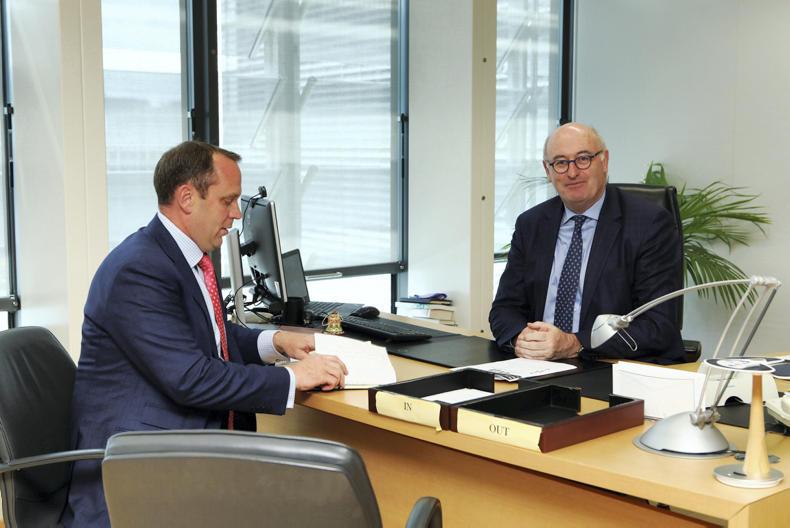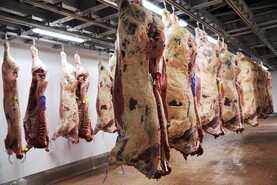Commissioner for Agriculture Phil Hogan has come under severe heat since he announced on Friday that the EU had struck a trade deal with the Mercosur trading block. Irish attention naturally focused on what concession had been granted in relation to access for agricultural produce into the EU.
The news was never going to be good, particularly in the case of beef and poultry.
Giving access to the EU market for 99,000t carcase weight equivalent (cwe) of beef and 180,000t of poultry as well as reducing the tariff on a 47,000t (61,000t cwe) Hilton quota from 20% to 0% and is never going to get approval from Irish farmers.
Timing
Farmers see Mercosur as another blow to an already depressed market which has left farmers dealing with falling prices as the grey clouds of a no-deal Brexit continue to gather.
So what was the logic in striking a trade deal with South America at a time when there was so much uncertainty in the internal market?
According to the commissioner, the move was with one eye on future negotiations with the UK.
A commitment to drive up standards in South America as part of a Mercosur deal is seen as a way to prevent substandard beef entering into the UK.
The obvious strategy in any EU-UK free trade negotiations would be that the UK would have to commit to imposing common EU standards on beef and poultry imports from Mercosur and also require adherence to the same environmental regulations.
From the commissioner it is clear that within the Commission Brexit is seen as a much bigger threat to the internal beef market than a Mercosur trade deal
While not confirmed by the commissioner, there is a widespread view in Brussels that negotiations received renewed impetus when German Chancellor Angela Merkel put her political might behind the process seeking to secure increased access for German cars into the South American market. From the commissioner it is clear that within the Commission Brexit is seen as a much bigger threat to the internal beef market than a Mercosur trade deal. He highlights how the impact of Brexit could be felt in the market in a matter of months while the impact of any Mercosur deal will not be fully felt until 2028.

Justin McCarthy with Comissioner Phil Hogan.
Impact
Even then the commissioner sees the impact of reduced tariffs on beef, poultry and pigmeat imports as having limited impact on farmgate prices in the EU. He highlights the market safeguard mechanisms contained in the agreement that allow imports to be suspended in the event of severe market disturbance. This safeguard mechanism is viewed by the commissioner as providing more robust protection than actually allocating specific quotas for various beef cuts within the 99,000t with a TRQ of 7.5%.
In theory, when we consider that as part of the deal the 20% tariff on the 47,000t (61,000t cwe) Hilton quota will be abolished, the lack of a specific beef cut quota could see the Mercosur block flood 150,000t of steaking cuts into the EU at a tariff rate of 7.5% or less.
This would have a devastating impact on the EU beef prices and exposes the sleight of hand when it is claimed that the tariff-reduced quota granted to the EU accounts for just 1.3% of EU production. It would require over 4m cattle, more than twice the Irish kill, to supply that amount of steak meat.
While accepting the risk, the commissioner does not see such a scenario developing and if it did the safeguard mechanism would be triggered to suspend imports for a two-year period. Under the terms of the agreement, there would be the potential to extend this suspension for a further two years.
Standards
The commissioner is equally as bullish on the issue of standards. Unless the Mercosur countries comply 100% with EU standards on farms supplying the EU market then their beef will not enter the EU.
It is a marked change from previous positions held where the EU only required equivalent standards to be met.
This allowed for traceability on Brazilian farms supplying the EU market to be limited to 90 days pre-slaughter. This will no longer be acceptable according to the commissioner.
“This deal will see Mercosur increase standards to EU levels, the highest food safety standards in the world. The EU will not be reducing standards,” he said.
Environment
On the issue of the environment and climate, he is equally clear on the need for the Mercosur block to address environmentally damaging practices, particularly in relation to deforestation. He cites a condition in the agreement that Brazil will be required to afforest 12m hectares of land by 2030 alongside a commitment that illegal deforestation will have ceased.
Again, this is a worthy ambition but the track record of Brazil in particular in complying with EU standards has been shambolic, with fraud detected.
Furthermore, reversing what has been an accelerating deforestation programme in recent years will require a total change in mindset both on the ground and politically. Again, Hogan closes the door on there being scope for any country in Mercosur to renege on any aspect of the agreement in relation to standards and environment.
The commissioner is adamant that the deal will bring Mercosur into line with the EU on standards and transform its approach to the environment
“We have a clear list of the environmental commitments agreed by Mercosur and if they fail to deliver them, the deal collapses.
The commissioner is adamant that the deal will bring Mercosur into line with the EU on standards and transform its approach to the environment. Translating this theory to practice is where farmers lack confidence based on experience.
The challenge for the incoming Commission if the deal is approved is to demonstrate that they mean what they say when insisting on same standards and delivery of a turnaround to Brazil’s forest policy.
Commissioner for Agriculture Phil Hogan has come under severe heat since he announced on Friday that the EU had struck a trade deal with the Mercosur trading block. Irish attention naturally focused on what concession had been granted in relation to access for agricultural produce into the EU.
The news was never going to be good, particularly in the case of beef and poultry.
Giving access to the EU market for 99,000t carcase weight equivalent (cwe) of beef and 180,000t of poultry as well as reducing the tariff on a 47,000t (61,000t cwe) Hilton quota from 20% to 0% and is never going to get approval from Irish farmers.
Timing
Farmers see Mercosur as another blow to an already depressed market which has left farmers dealing with falling prices as the grey clouds of a no-deal Brexit continue to gather.
So what was the logic in striking a trade deal with South America at a time when there was so much uncertainty in the internal market?
According to the commissioner, the move was with one eye on future negotiations with the UK.
A commitment to drive up standards in South America as part of a Mercosur deal is seen as a way to prevent substandard beef entering into the UK.
The obvious strategy in any EU-UK free trade negotiations would be that the UK would have to commit to imposing common EU standards on beef and poultry imports from Mercosur and also require adherence to the same environmental regulations.
From the commissioner it is clear that within the Commission Brexit is seen as a much bigger threat to the internal beef market than a Mercosur trade deal
While not confirmed by the commissioner, there is a widespread view in Brussels that negotiations received renewed impetus when German Chancellor Angela Merkel put her political might behind the process seeking to secure increased access for German cars into the South American market. From the commissioner it is clear that within the Commission Brexit is seen as a much bigger threat to the internal beef market than a Mercosur trade deal. He highlights how the impact of Brexit could be felt in the market in a matter of months while the impact of any Mercosur deal will not be fully felt until 2028.

Justin McCarthy with Comissioner Phil Hogan.
Impact
Even then the commissioner sees the impact of reduced tariffs on beef, poultry and pigmeat imports as having limited impact on farmgate prices in the EU. He highlights the market safeguard mechanisms contained in the agreement that allow imports to be suspended in the event of severe market disturbance. This safeguard mechanism is viewed by the commissioner as providing more robust protection than actually allocating specific quotas for various beef cuts within the 99,000t with a TRQ of 7.5%.
In theory, when we consider that as part of the deal the 20% tariff on the 47,000t (61,000t cwe) Hilton quota will be abolished, the lack of a specific beef cut quota could see the Mercosur block flood 150,000t of steaking cuts into the EU at a tariff rate of 7.5% or less.
This would have a devastating impact on the EU beef prices and exposes the sleight of hand when it is claimed that the tariff-reduced quota granted to the EU accounts for just 1.3% of EU production. It would require over 4m cattle, more than twice the Irish kill, to supply that amount of steak meat.
While accepting the risk, the commissioner does not see such a scenario developing and if it did the safeguard mechanism would be triggered to suspend imports for a two-year period. Under the terms of the agreement, there would be the potential to extend this suspension for a further two years.
Standards
The commissioner is equally as bullish on the issue of standards. Unless the Mercosur countries comply 100% with EU standards on farms supplying the EU market then their beef will not enter the EU.
It is a marked change from previous positions held where the EU only required equivalent standards to be met.
This allowed for traceability on Brazilian farms supplying the EU market to be limited to 90 days pre-slaughter. This will no longer be acceptable according to the commissioner.
“This deal will see Mercosur increase standards to EU levels, the highest food safety standards in the world. The EU will not be reducing standards,” he said.
Environment
On the issue of the environment and climate, he is equally clear on the need for the Mercosur block to address environmentally damaging practices, particularly in relation to deforestation. He cites a condition in the agreement that Brazil will be required to afforest 12m hectares of land by 2030 alongside a commitment that illegal deforestation will have ceased.
Again, this is a worthy ambition but the track record of Brazil in particular in complying with EU standards has been shambolic, with fraud detected.
Furthermore, reversing what has been an accelerating deforestation programme in recent years will require a total change in mindset both on the ground and politically. Again, Hogan closes the door on there being scope for any country in Mercosur to renege on any aspect of the agreement in relation to standards and environment.
The commissioner is adamant that the deal will bring Mercosur into line with the EU on standards and transform its approach to the environment
“We have a clear list of the environmental commitments agreed by Mercosur and if they fail to deliver them, the deal collapses.
The commissioner is adamant that the deal will bring Mercosur into line with the EU on standards and transform its approach to the environment. Translating this theory to practice is where farmers lack confidence based on experience.
The challenge for the incoming Commission if the deal is approved is to demonstrate that they mean what they say when insisting on same standards and delivery of a turnaround to Brazil’s forest policy.







 This is a subscriber-only article
This is a subscriber-only article










SHARING OPTIONS: